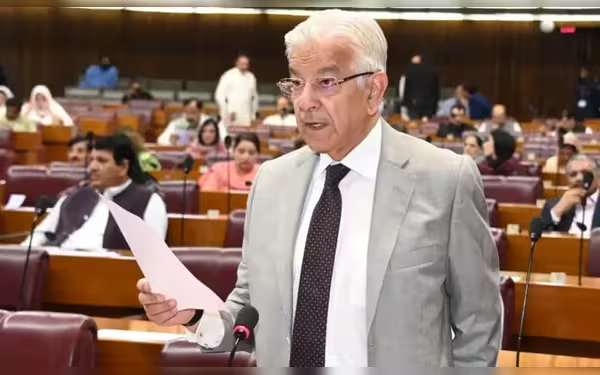Saturday, November 16, 2024 07:52 PM
Khawaja Asif Accuses PTI of Double Game Amid Gandapur's Alleged Contacts
- Khawaja Asif criticizes PTI's contradictory political behavior.
- Gandapur's alleged ties with the Establishment raise concerns.
- Call for transparency in politics emphasized by Asif.
 Image Credits: thefrontierpost
Image Credits: thefrontierpostKhawaja Asif accuses PTI of playing a double game, highlighting Gandapur's alleged contacts with the Establishment.
In recent developments within Pakistan's political landscape, Defence Minister Khawaja Asif has raised serious concerns regarding the actions of the Pakistan Tehreek-e-Insaf (PTI) party, led by its founder Imran Khan. Asif's remarks come in the wake of what he describes as a "double game" being played by PTI, particularly highlighting the behavior of party member Ali Amin Gandapur. This situation has sparked significant debate and scrutiny among political analysts and the public alike.
During a session of the National Assembly, Khawaja Asif expressed his dismay over the tweets made by Imran Khan, which he believes have negatively impacted the political environment in the country. He pointed out that Gandapur had willingly spent seven hours in a location that raised eyebrows, suggesting that he was in contact with the "Establishment," a term often used to refer to the military and influential power brokers in Pakistan. Asif's comments indicate a belief that PTI is engaging in contradictory behavior, publicly criticizing the Establishment one day and seeking its support the next.
Asif further elaborated on his concerns, stating that Imran Khan appears to be seeking political relief through the Chief Minister of Khyber Pakhtunkhwa. He accused Gandapur of using language reminiscent of separatist movements, implying that such rhetoric could be detrimental to national unity. The Defence Minister's assertion that Khan is keeping the option of a separation movement open raises alarms about the potential implications for Pakistan's stability.
In his address, Khawaja Asif emphasized the need for transparency in politics, insisting that there should be no "double game" being played. He suggested that the idea of forming a parliamentary committee with members from both the government and opposition should be reconsidered, as it may not lead to the desired outcomes. Asif's comments reflect a growing frustration with the current political dynamics, where trust and cooperation seem to be in short supply.
Moreover, Asif's remarks about General Faiz Hameed, suggesting that he might be communicating from jail, add another layer of complexity to the situation. This insinuation hints at the intricate relationships between political figures and military leadership in Pakistan, which often shape the country's governance.
As the political drama unfolds, it is evident that the actions of PTI and its leaders will continue to be scrutinized. The public is left to ponder the implications of such political maneuvering on the future of democracy in Pakistan. With the political climate becoming increasingly charged, it is crucial for all parties involved to prioritize the nation's stability over personal or party interests. The call for a more straightforward and honest political discourse is louder than ever, as citizens seek clarity and accountability from their leaders.













